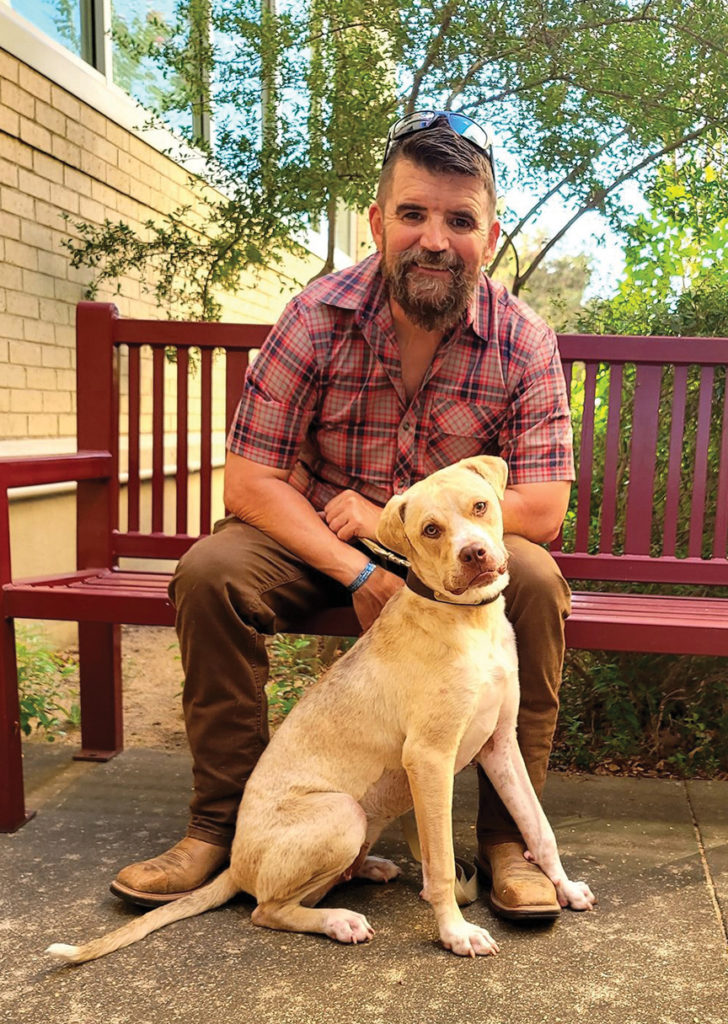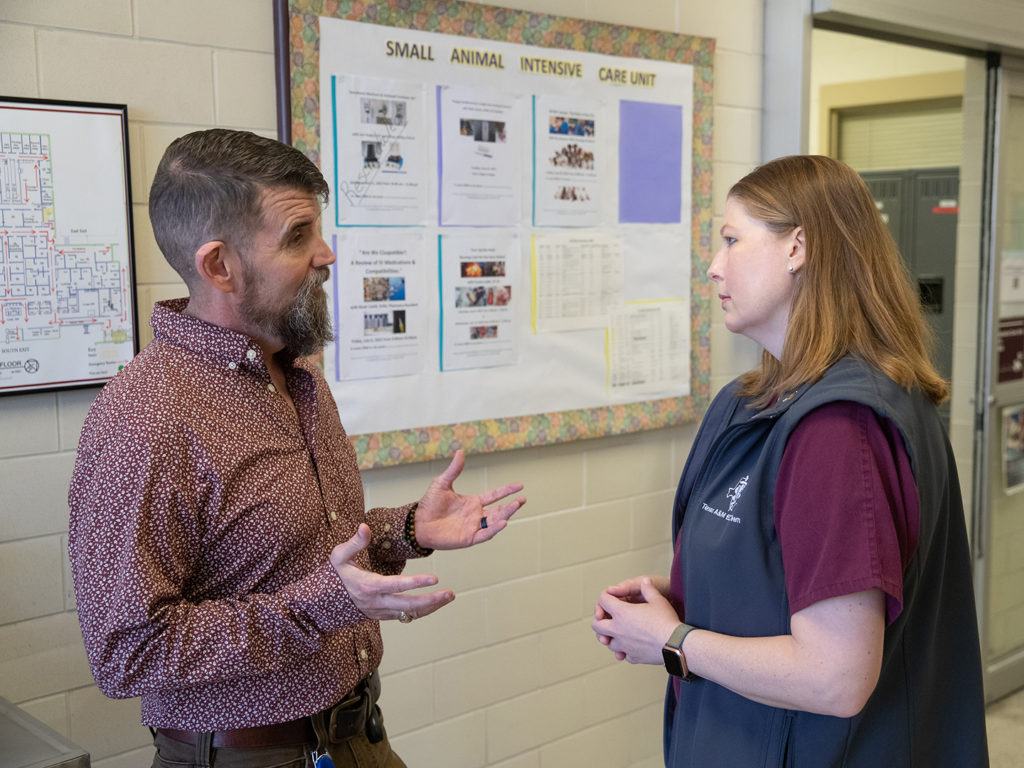VMTH’s Professional Counselor Supports Hospital Clients, Staff
Story by Aubrey Bloom

Texas A&M University was there at a critical time in Michael Hawkins’ life.
“I’ve always had a severe learning disability, and academics were always extremely challenging for me,” he said. “But during my time at Texas A&M, I had professors and counselors who really helped me get through it, who helped me academically. Every time I went to a professor and said, ‘I’m struggling with this. Can you help me out?’ they would work with me.”
Now, as the Texas A&M School of Veterinary Medicine & Biomedical Sciences (VMBS) Veterinary Medical Teaching Hospital’s (VMTH) first full-time counselor, he’s hoping to return the favor.
“When I found this job, I saw it as an opportunity to help students, staff, and clients and just be there for their critical moments, too, just like people were there for me,” he said. “That was one of the really exciting things for me.”
Hawkins joined the VMTH at a time when more and more attention is being paid to the mental health side of the veterinary industry. He says it’s a dream opportunity to come back and make an impact at a place that had such an impact on him.
His challenges go back to childhood, when he learned that he had a severe type of dyslexia, which not only caused him to switch information around as he processed it, but also when he tried to recall it later.
“If I had to learn 123, my brain might process it as 321 or 312,” he said. “Then, as I recalled the information, my brain would scramble it again. It might be 132 at that point. I attended a school for children with dyslexia called The Winston School until the sixth grade. At that point in my life, graduating from high school would have been a huge accomplishment.”
Hawkins wasn’t satisfied with that outlook, though. He moved to a college prep high school, where things were even tougher; he studied at least three hours per night just to pass. When he was tested again, he was told that his disability was still severe and even if he graduated high school, it was even more unlikely he would be able to graduate from college.
However, he embraced that challenge also.
“My five years at Texas A&M were the most challenging I had ever faced,” he said. “I had to study harder than I ever had before. If I had a test, I would start studying weeks in advance, for hours and hours, to get a ‘C.’
“It was a constant battle for me to keep trying and to stay motivated, but I would often go to my professors for help, and every professor I approached was not only helpful, but encouraging,” he said. “They spent extra time with me and were very supportive.”
He originally studied finance but switched to psychology because, at the time, he wanted to help dyslexic children and their families.
“Many people think that learning disabilities only affect one’s academic life,” he said. “The reality is that it can have an impact on every aspect of a person’s life. It affects a person emotionally, socially, and even physically.”
Hawkins graduated from Texas A&M in 1991 and went on to earn a master’s degree in social work from St. Edward’s University in Austin. It was at St. Edwards that he discovered a passion for law enforcement that would guide him to a new career path—working with the Houston Police Department’s Crisis Intervention Response Team.

Hawkins spent a decade in that role, during which he rode in a patrol car with an officer and responded to individuals in “severe crisis.”
“We responded to ‘the worst of the worst’ calls,” he said. “But one of the things I really liked about it—and I go back to my time at A&M—is that learning to overcome my disability actually helped me focus and problem solve quickly when I was on a call.
“I could go into these chaotic situations and the discipline that I had learned helped me,” he said. “In their most difficult times and challenges, I was able to connect with them, get them help, bring some kindness and compassion, and peacefully resolve the situation.”
Now, at the VMTH, Hawkins is using that experience as he works with the VMTH staff and clients who are facing difficult decisions and situations.
One of the challenges he has witnessed at the VMTH is that sometimes people don’t seek out the emotional support they need because of a perceived social stigma around having an emotional attachment to an animal.
“I’ve had people tell me that others have told them, ‘oh, it’s just a pet,’” he said. “But for a lot of people, pets are a part of their family, especially during COVID-19 when people can’t have the normal social interactions that they usually do. Animals provide that same comfort and companionship. So I have to tell people, ‘This animal is part of your family; it provided you support. Ignore anyone who’s saying otherwise.’”
Hawkins also uses his skills to support the hospital staff, something he said he’s looking forward to doing more of, especially because the mental health of those in the veterinary industry is something that was overlooked for too long, even as suicide rates rose in recent years in the profession. The VMTH is one of several veterinary hospitals that have added more support for the mental health of the staff.
“I see accomplishing that mission by helping the doctors and staff when they need to debrief, maybe taking on some of that emotional load,” he said. “Hopefully, by addressing the emotional side of things, they can also focus on the care of the animals.
“Veterinary medicine is more of an exact science, but I see the work that I do as more like an art,” he said. “Each situation is a little different and requires different skills, application, or interaction.”
Hawkins’ experience in dealing with chaotic situations also made him a perfect fit for the Veterinary Emergency Team (VET); Hawkins has deployed with the team once since joining VMTH.
“I was a part of a lot of crisis scenes in Houston and went into really active, very large, chaotic scenes,” he said. “I hope to be able to go into some of these scenes with the VET and provide support in that sense; do debriefings, if needed; and help make sure the team members are taking care of themselves.”
Even though the world of veterinary medicine is different from the types of scenes he responded to in Houston, he said there are universal aspects to the job.
“Grief is grief, and sadness is sadness,” Hawkins said. “When I was on patrol, I experienced people feeling profound grief, and here, the clients I’m speaking with at the hospital may be dealing with profound grief. Whether it is for an animal, a person, or something else, there are similarities.”
###
Note: This story originally appeared in the Summer 2022 edition of CVMBS Today.
For more information about the Texas A&M School of Veterinary Medicine & Biomedical Sciences, please visit our website at vetmed.tamu.edu or join us on Facebook, Instagram, and Twitter.
Contact Information: Jennifer Gauntt, Director of VMBS Communications, Texas A&M School of Veterinary Medicine & Biomedical Sciences; jgauntt@cvm.tamu.edu; 979-862-4216


